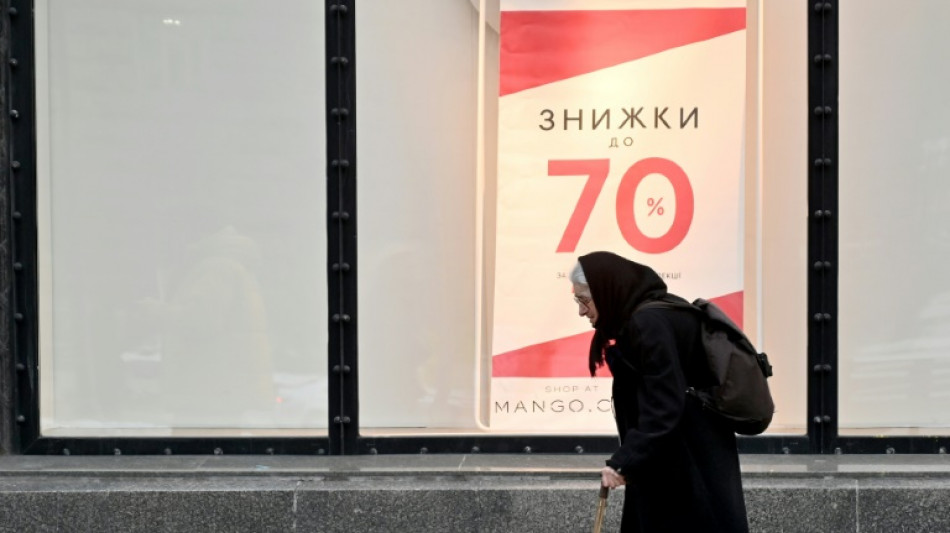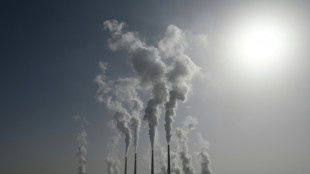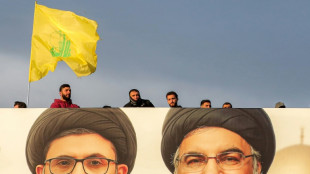
-
 Tanaka strikes again as Japan down Colombia
Tanaka strikes again as Japan down Colombia
-
Baker wins US indoor 60m as Kessler, Hiltz complete double

-
 Kane admits last-minute decision to make Bayern bench
Kane admits last-minute decision to make Bayern bench
-
Bakers wins US indoor 60m as Kessler, Hiltz complete double

-
 American Airlines flight lands in Rome after 'security' issue
American Airlines flight lands in Rome after 'security' issue
-
Dupont eyeing Six Nations showdown with Ireland after Italy rout

-
 Slot wary of Premier League dangers despite 'big' Man City win
Slot wary of Premier League dangers despite 'big' Man City win
-
Borthwick defiant after uninspired England edge Scotland

-
 Nations at odds over major UN climate science report
Nations at odds over major UN climate science report
-
Pakistan fans look away from India Champions Trophy 'humiliation'

-
 Global prayers as Vatican says pope still 'critical'
Global prayers as Vatican says pope still 'critical'
-
Pakistan's Rizwan admits Champions Trophy dream 'ended' by India

-
 France star Dupont eyeing Six Nations showdown with Ireland after Italy destruction
France star Dupont eyeing Six Nations showdown with Ireland after Italy destruction
-
'We need another title', says Salah after 'special' Man City win

-
 Relentless Bayern stay eight points clear
Relentless Bayern stay eight points clear
-
Kohli shuts down 'noise' with landmark century

-
 Modric stunner maintains Real Madrid title charge
Modric stunner maintains Real Madrid title charge
-
Salah-inspired Liverpool beat Man City to open up 11-point Premier League lead

-
 Townsend wants England agony to inspire Scotland for Six Nations finish
Townsend wants England agony to inspire Scotland for Six Nations finish
-
Eleven-try France destroy Italy to set up Six Nations showdown with Ireland

-
 Every game 'pressure' as Bangladesh face make-or-break clash
Every game 'pressure' as Bangladesh face make-or-break clash
-
Conservatives win German vote as far-right makes record gains

-
 Israel ready to resume Gaza war, PM warns after truce delay
Israel ready to resume Gaza war, PM warns after truce delay
-
'Captain America' slips but clings to N. America box office lead

-
 Modric hits rocket as Real Madrid beat Girona
Modric hits rocket as Real Madrid beat Girona
-
Eleven-try France hammer Italy 73-24 in Six Nations

-
 Kohli hits ton as India push Pakistan to brink of Champions Trophy exit
Kohli hits ton as India push Pakistan to brink of Champions Trophy exit
-
Zelensky offers to resign in exchange for Ukrainian NATO membership

-
 US ski star Shiffrin hits 100 to cement legendary status
US ski star Shiffrin hits 100 to cement legendary status
-
Forest felled by Isak as Newcastle bolster top four bid

-
 Man City's Haaland ruled out for Liverpool clash
Man City's Haaland ruled out for Liverpool clash
-
Referee 'corruption' accusations leave Marseille president Longoria facing punishment

-
 Van Persie returns to Feyenoord as coach
Van Persie returns to Feyenoord as coach
-
Athletic Bilbao crush Valladolid to maintain top four pace

-
 Former soccer star Ozil goes into Turkish politics with ruling party
Former soccer star Ozil goes into Turkish politics with ruling party
-
Shiffrin questioned return before claiming historic 100th World Cup win

-
 Angel Yin wins Thailand LPGA tournament by one shot
Angel Yin wins Thailand LPGA tournament by one shot
-
Pogacar wins the UAE Tour with mountain break

-
 Napoli concede Serie A lead to Inter after losing at Como
Napoli concede Serie A lead to Inter after losing at Como
-
India bowl out Pakistan for 241 after Shakeel-Rizwan stand

-
 Shiffrin takes historic 100th World Cup win with Sestriere slalom
Shiffrin takes historic 100th World Cup win with Sestriere slalom
-
Tens of thousands vow support for Lebanon's Hezbollah at slain leader's funeral

-
 Israel says army to stay in evacuated West Bank camps for 'coming year'
Israel says army to stay in evacuated West Bank camps for 'coming year'
-
Odermatt underlines super-G power with World Cup win at Crans-Montana

-
 Kremlin hails Putin-Trump dialogue as promising
Kremlin hails Putin-Trump dialogue as promising
-
Tens of thousands vow support for Hezbollah at Beirut funeral of slain leader

-
 Does revival or retirement await James Bond at Amazon?
Does revival or retirement await James Bond at Amazon?
-
Sudan's RSF, allies sign charter for rival government

-
 Hamas says Gaza truce gravely endangered after Israel's prisoner delay
Hamas says Gaza truce gravely endangered after Israel's prisoner delay
-
Ex-PM Thaksin apologises over massacre in southern Thailand


Invasion or not, Ukraine's economy is already paying price
In his open-plan office in the centre of Kyiv, tech executive Dmytro Voloshyn lists off the tricky questions he's dealt with over the last weeks as fears have soared over a possible Russian invasion.
What will happen if things escalate? What to do with foreign staff? What will happen if martial law is declared? What if the banking system collapses? What if the internet gets cut?
"We've basically had to prepare a contingency plan with answers to all of these questions," he told AFP, showing a chart on his laptop detailing different options for different scenarios.
Preply, the company co-founded by Voloshyn in 2013, bills itself as one of the main online platforms connecting language students to teachers across the world. It employs some 400 people in Kyiv and Barcelona.
With its sleek office design, plants creeping up the walls, cafe for employees, it looks like a Silicon Valley start-up and is considered one of the successes of Ukraine's high-tech sector.
But like the rest of the Ukrainian capital it is currently living a strange double life. Work is going on as normal, people are carrying on with everyday tasks, and nothing seems out of the ordinary.
At the same time -- as Western leaders warn about the threat from Moscow's troops massed on the border -- some people are bracing for the worst.
According to a survey by the European Business Association, which includes many multinationals operating in Ukraine, 40 percent of its members have already prepared emergency plans and 40 percent intend to do so.
"We have a plan, but we don't execute it because we are very confident the situation will stay as it is," Voloshyn, 34, says.
Voloshyn points out that Ukrainian businesses, like the broader population, have got used to living in a state of heightened alert since the Kremlin seized Crimea in 2014 and began fuelling a separatist conflict in the east that has killed over 13,000 people.
"We are not panicking because we know that this situation lasts for eight years already for us," he says.
"It was always that kind of tension here in Ukraine, and now it's more immediate and it escalates obviously, but we are not in a panic mode."
In fact, the crisis in 2014 spurred his company on. It pushed them to grow the business abroad as Ukraine's economy melted down and they sought to protect themselves from the turbulence.
- Weak currency, inflation -
The risk of a Russian invasion, which Moscow denies it is plotting, has not yet caused such catastrophic consequences as it did back then.
But it is already having a very real impact, freezing projects and scaring off some investors.
The central bank has lowered its growth forecast for 2022 to 3.4 percent from 3.8 percent.
It has also had to spend more than $1 billion since the beginning of the year to keep the local currency, the hryvnia, afloat as worried investors have moved money out of the country.
Despite that, the currency has still fallen to its lowest level in four years, fuelling inflation and undermining the purchasing power of households in one of Europe's poorest countries.
The situation has pushed President Volodymyr Zelensky to try to counter some of the more alarmist warnings coming from the West, insisting the priority was to stabilise the economy rather than stir "panic".
For Sofya Donets, an economist at investment firm Renaissance Capital, Ukraine is currently in a stronger position than in 2014 to withstand financial pressure.
It has more than doubled its reserves and is due an influx of Western assistance, with the European Union pledging a further 1.2 billion euros and talks ongoing to unlock new funds from the International Monetary Fund.
"However, this only works to smooth the effect of the prolonged turbulence, but not the full-scale military conflict," she said.
- 'Permanent threat' -
Currently unable to borrow on international markets, the Ukrainian state remains dependant on its international donors.
The government complains the country is suffering from a geopolitical situation beyond its control despite economic "fundamentals" that it insists are solid.
"We have been living since 2014 in a state of permanent threat from Russia, and now this is becoming news to the world," Finance Minister Sergiy Marchenko said in an interview with the Ekonomichna Pravda website.
"Tension cannot increase permanently," he insisted in a bid to reassure.
In the meantime, companies like Voloshyn's are getting ready.
But even if the worst does not happen, economists warn that the spike in tensions further dents the county's longer-term prospects.
"The risk premium for doing business in Ukraine has certainly increased," Lilit Gevorgyan, an economist at IHS Markit.
"This risk perception will not significantly come down unless tangible progress is made between Ukraine and Russia to solve the conflict. Chances of the latter are slim."
C.Garcia--AMWN